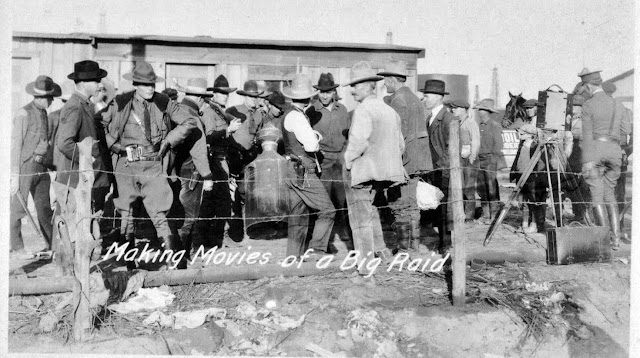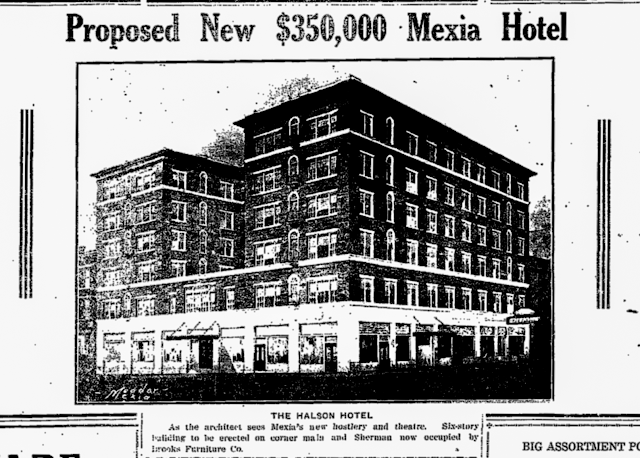Martial Law Comes to Mexia for 47 Days: January 12 to Feb. 28 1922
Life was pretty exciting in Mexia in 1922, as long as you managed not to get killed.
The headlines on Monday, January 9 are inextricably linked. The oil boom had brought with it, as always, the rush of money and people rushing to chase the money. 1921 had seen the town population swell exponentially. There wasn't enough of anything in Mexia, not enough water, or train tracks, or beds, or restaurants, and, naturally, not enough law to handle the vice that accompanied roughnecks in the field making money.
By the dawn of 1922, things were getting intolerable. The headline "Martial Law Not to Be Declared Here Now was just the handwriting on the wall.
There was a raid two nights before, at 11:00 on Saturday night, "zero hour when Federal and Sate officers, rangers, and prohibition agents went 'over the top,' at the Winter Garden and Chicken Farm, capturing the two resorts without a drop of blood and with only one shot fired, which was shot more in play than from any real cause, and was directed at a port hole used by guards to keep a 'peep out' for any threatened 'danger' at the Chicken Farm. Over ten thousand dollars [$150,000 in 2018] worth of corn liquor and various varieties were captures and some two scores of the inmates of the two places were taken . . ."

They had brought two machine guns in the event they had to "shell the foundations of the houses until the building collapsed and the walls fell in" but they were not needed.
The Rangers and Federal Prohibition officers had no trouble in finding the places, they said. The big sign placed on the Teague highway about four miles from Mexia pointing the way to the Winter Garden, located a few hundred yards from the muchly traveled road, made it impossible for that place to be mistaken. A similar sign, reading 'The Farm' pointing the way to this resort about four miles from Mexia and just off the Mexia-Wortham highway also thoroughly identified this place to the law. . ."
photos from the following morning
What transpired in the interim of January 10 & 11 is the discovery that, according to the Adjutant General's report of the Jan. 9 raids, "It was soon evident that the local officials were hindering rather than helping us on these operations and it was decided that nothing short of Martial Law would aid in clearing up the community.”
from Texas Tech's Southwest Collection, available here
Courtesy of the Confederate Reunion Grounds Historic Site
On Thursday, NOW was here.
January 12, Day 1
Governor Neff in Mexia 1922
The first orders of Gen. Wolters
January 13, Day 2
A day later, more papers were whipping up some good selling headlines
(Brownwood Bulletin Front Page)
January 14, Day 3
Out of Galveston
Out of Mexia
that really didn't slow down the big headlines right away, though,
especially since the big fire downtown swept through that night
January 15, Day 4
From the Weimar Mercury pages:
January 17, Day 5
The Port Arthur Daily's front page featured two photos from the January 8 raids on Winter Garden and the Chicken Ranch, one with the roulette wheel and the other with the hootch
January 18, Day 6
During these early days, the first Mexia Chamber of Commerce formed. The City would hire a city manager and lawyer in the coming days as well.
January 19, Day 7
Filth and Lawlessness!
"State force is back of the clean up campaign embracing not only an attack on Godlessness and lawlessness but on uncleanliness as well. . . . It's too bad that Mexia citizens, however, have to hear the shame that is attached to the reputation that this late development will give the city . . . "
from the Bryan Eagle
from The Burlington Gazette
from The Dubuque Telegraph Herald
from The McKinney Courier
Thousands of undesirable persons have left. It is noticeable today that hundreds of new faces are on the streets and in hotel lobbies -- but they are solid citizens coming to this wonderful city to investigate and invest. Before we leave Mexia will again be as safe a place to live in as it was before it became the magnet that drew investors and laborers from corners of the world, followed by the human vultures that have been preying largely upon the workingmen.
The Lincoln Nebraska State Journal had a front page piece with some background on the overnight growth in the final months of 1921
Week 2, Jan. 20 - 26
(portion between the front page and following page was partially cut off)
Week 3, Jan. 27 - Feb. 2
Week 4, Feb. 3 - 9
the young pilot pictured above on his first assignment would go on to become Brigadier General Yantis H. Taylor
Week 5, Feb. 10 - 16
Week 6, Feb. 17 - 23
Week 7, Feb. 24 - March 2
A few excerpts from the chapter on Mexia that caught my eye as not something previously published in the papers at the time:
This was the first time that oilfield crooks had been mugged and fingerprints taken.
This resulted in the arrest, by military authorities, of criminals under indictment in other counties in Texas and in other states. Such persons were delivered to the proper authorities.
Thirteen automobiles were turned over to and taken possession of by the Federal authorities in which whisky was illegally transported. Fifty-three stolen automobiles were recovered, identified and returned to the, owners. Twelve peddlers of narcotics were arrested turned over to the Federal authorities and sent to Federal prisons. Among the number were five who had a national reputation in the underworld, as narcotic peddlers. These were not addicts, but purely cold-blooded sellers of dope. More than four thousand dollars worth of narcotics were taken from the possession of these peddlers and destroyed. Six hundred and two persons were arrested within the military district, of which 81 were sundry minor charges. The crimes with which these persons were charged included murder, assault to murder, operating gambling houses, desertion from the United States Army, safe blowing, violation of the National Prohibition Act, resisting an officer, possession of stolen property, theft, gaming, carrying pistols or knucks, building stills, vagrancy, highway robbery with firearms, violation of Harrison Narcotic Act, held for other states and counties, various felony offenses, already under indictment, (16), sundry minor charges, burglary, aggravated assault, disorderly conduct, passing fire trucks, adultery, violation of Mann Act, disturbing the peace, arson, assaults, swindling, forgery, perjury, selling mortgaged property, assault with intent to rape.
Each case was investigated by Major Machen. The evidence reduced to writing and sworn to by witnesses, original delivered to the civil officers and copy retained. A large quantity of gambling paraphernalia of the approximate value of $5,000 was taken and in accordance with Texas law, destroyed.
One incident may be of especial mention. Early one evening a fire originating in a restaurant spread and ultimately destroyed two business city blocks in the town of Mexia. Almost instantly it was discovered that thieves were busy. The Rangers at once were detailed into alleys and other adjacent places where theft could be prevented. A crowd aggregating fully 15,000 people congregated. The majority of them, of course, law abiding citizens, but many of them roughnecks and toughs. It looked like a wild night. The crowds were congregated on all four sides of the fire. Three of them on streets in the town proper and the other Little Juarez, an addition that had been built south of the railroad tracks, consisting all together of shacks and where the tough element prevailed.
The commanding general had at his disposition, Major Dorenfield, Quartermaster, Captain Harry H. Johnson, Adjutant, Captain W. E. Huddleston, Medical Officer, and eleven soldiers. He divided this detachment into three parts and ordered them to move the crowds from the streets. An officer went with each detail. The soldiers carrying the rifles at the port and a smile on their faces, hopped to it. Now and then it was necessary to kick a tough under the chin or in the pit of the stomach with the butt end of the rifle, but the crowds moved and moved until the streets were clear. Then with the entire detail the crowds were likewise moved on the south side, that is, in Little Juarez. Only one “bully” out of the hundreds of toughs congregated there showed resistance. A jolt on the head with the handle end of a strong crop disposed of him and the rest moved with only a murmur.
Fifteen thousand people, many of them ill disposed towards the military authorities, had been moved by eleven men and three officers and made to go to their quarters without any serious clashes. The purpose of mentioning this incident is that it shows that a small force of uniformed and armed men with a smile on their faces can accomplish things which would appear ordinarily as impossible.

























































































































































































Comments
Post a Comment